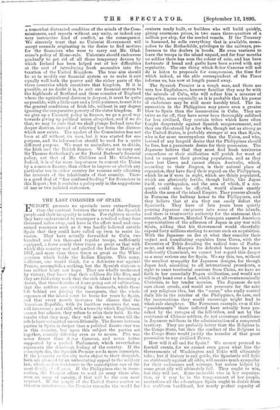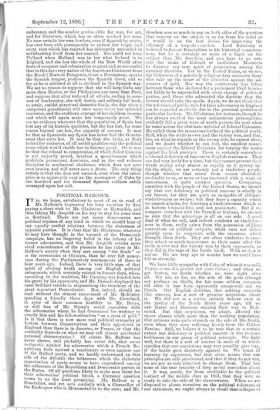THE LAST COLONIES OF SPAIN.
-EUROPE presents no spectacle more extraordinary than the contrast between the nerve of the Spanish people and their incapacity in action. For eighteen months they have endeavoured to reconquer a revolted colony four thousand miles away, and have in the effort used and con- sumed resources such as it was hardly believed outside 'Spain that they could have called up even to resist in- vasion. They have actually forwarded to Cuba two hundred and ten thousand regular troops, sufficiently equipped, a force nearly three times as great as that with which this country met and quelled the Indian Mutiny of 1857, and more than three times as great as the White garrison which bolds the Indian Empire. This army, -sufficient, one would think, for a defensive war against France, accomplishes nothing, but the Spanish statesmen lose neither heart nor hope. They are wholly uncheered by victory, they know that their soldiers die like flies, and they are told every week that the rich island is becoming a desert, that three-fourths of it are going out of cultivation, that the settlers are quitting in thousands, while those left. behind are joining the insurgents, that the whole expenses of the island must be borne for years by Spain, and that every month increases the chance that the American Republic, with its limitless resources for war, will intervene ; and still, with a tenacity which Englishmen cannot but admire, they refuse to relax their hold. Be the results what they may, they will make no terms till the rebels have submitted unconditionally. The fissure between parties in Spain is deeper than a political fissure ever was in this country, but upon this subject the parties act together, scarcely differing even as to means. Pitt was never firmer than SAIer Canovas, and never better supported by a packed Parliament, which nevertheless represents the dominant feeling of the country. If the conscripts die, the Spanish Premier sends more conscripts. If the peasants or the city mobs object to their despatch, both are silenced by an unhesitating appeal to the military law, which makes resistance to the conscription one of the most &ad ly of off, nces. If the Philippines rise in insur- rection, the Premier offers to send an army there also, even an army of cavalry, if that will be the arm most required. If the people of the United States mutter or threaten interfereeee, the Premier ransacks the world for cruisers ready built, or builders who will build quickly, giving enormous prices, in two cases three-quarters of a million per ship, for the needed vessels. If the Treasury is harassed, he sells everything that is available, mono- polies to the Rothschilds, privileges to the railways, pre- ferences to the dealers in bonds. He even ventures to leave the troops in the island unpaid, and for four months no soldier there has seen the colour of coin, and has been fortunate if bread and garlic have been served with any regularity. The one thing which Senor Canovas will not do is listen to proposals for compromise, the time for which indeed, as the able correspondent of the Times informs us, has now at length passed away.
The Spanish Premier is a tough man, and there are very few Englishmen, however familiar they may be with the misrule of Cuba, who will refuse him a measure of sympathy, more especially as it is probable that his power of endurance may be still more harshly tried. The in- surrection in the Philippines may prove even a greater blow to Spain than the insurrection in Cuba. They are twice as far off, they have never been thoroughly subdued far less civilised, they contain tribes which have often fought desperately against Spanish misgovernment, and they are threatened by a foe who, though not as strong as the United States, is probably stronger at sea than Spain, who is far more unscrupulous than the Union, and who, instead of any languid desire that the Philippines should be free, has a passionate desire for their possession. The Japanese believe that they must find fresh territories somewhere or their civilisation will perish for want of land to support their growing population, and as they have lost Corea and cannot obtain Australia, which, according to their Jingoes, is their natural place of expansion, they have fixed their regard on the Philippines, which lie as it were in sight, which are thinly populated, which are gloriously fertile, though liable, like Japan itself, to earthquakes, and the area of which, if a con- quest could once be effected, would almost exactly double the area of the island Empire. They possess already in Formosa the halfway house to the Philippines, and they believe that at sea, they can easily defeat the Spaniards. They have of late years been quietly pouring Japanese emigrants into some of the islands, and there is trustworthy authority for the statement that recently, at Moscow, Marshal Yamagata assured American representatives of the adhesion of Japan in any war with Spain, adding that his Government would cheerfully expend forty millions sterling to secure such an acquisition. With the Japanese on fire at what they consider their unjust and humiliating expulsion from Corea, with the Executive of Tokio dreading the radical tone of Parlia- ment, and with Marquis Ito defeated because he is not sufficiently Chauvinist, we cannot but regard this danger as a most serious one for Spain. We say this, too, without the smallest sympathy for Japanese designs, for though Japan had, according to all international precedents, a right to exact territorial cessions from China, we have no faith in her essentially Pagan civilisation, and would not willingly hand over a land, which is at all eventsnominally Christian, to her tender mercies. The Japanese do not care about creeds, and would not persecute for the sake of any religious idea, but the curas," who really control daily life in the interior of the Philippines, do care, and the insurrections they would encourage might lead to wholesale slaughter. The Formosan example, even if the " punishments " there inflicted have actually been pro- voked by the ravages of the hill-tribes, and not by the resistance of Chinese settlers, do not encourage confidence in Japanese mildness in the administration of a conquered territory. They are probably better than the Belgians in the Congo State, but then the conduct of the Belgians in the Congo State would justify the transfer of that great possession to any civilised Power.
How will it all end for Spain ? We cannot pretend to foretell events, for we cannot even guess what line the Governments of Washington and Tokio will ultimately take ; but if history is any guide, the Spaniards will fight on stubbornly against all odds, will receive much sympathy for their endurance and courage, but unless helped by some great ally will ultimately fail. They ought to win, but they will not. Some incurable vice in her organisa- tion, or it may be in the temperament of her people, neutralises all the advantages Spain ought to derive from her stubborn hardihood, her nearly perfect capacity of endurance, and the sombre genius alike for war, for art, and for literature, which has so often marked her sons. No race outside her own borders, even if Spanish by origin, has ever been able permanently to endure her reign, and every race which has resisted has ultimately succeeded in withdrawing itself from her control. She could not keep Fsslland when Holland was to her what Ireland is to England, and she lost the whole of the New World after feats of conquest and colonisation so great and sio successful that to this day every native of the American Continent from the Rio del Norte to Patagonia, if not a Portuguese, speaks the Spanish tongue, professes the Spanish creed, and so far as he is civilised at all is civilised in the Spanish way. We see no reason to suppose that she will keep Cuba any more than Mexico, or the Philippines any more than Peru, and suppose that after unheard of efforts, ending in some sort of bankruptcy, she will desist, and sullenly fall hack, to await, amidst perpetual domestic feuds, the day when a competent government will once more direct her splendid resources, and the stubborn courage of her children, to some end which will again make her temporarily great. We see no evidence whatever that the population of Spain has lost any of its historic qualities, but she has lost, for some reason beyond our ken, the capacity of success. It may be that as Spaniards say Spain has never had the Govern- ment that suits her. It may be that she lacks, as Italy lacked for centuries, of all useful qualities only the political sense which would enable her to become great. Or it may be that the refusal to compromise, of which Seiler Canovas is not unjustly proud, involves a mercilessness which prohibits permanent dominion, and in the end reduces discipline to mechanical obedience, which does not save even armies, and will never save a State. The only thing certain is that she does not succeed, even when the enter- prise is so apparently easy as the reconquest of Cuba by two hundred and ten thousand Spanish soldiers safely encamped upon her soil.



































 Previous page
Previous page